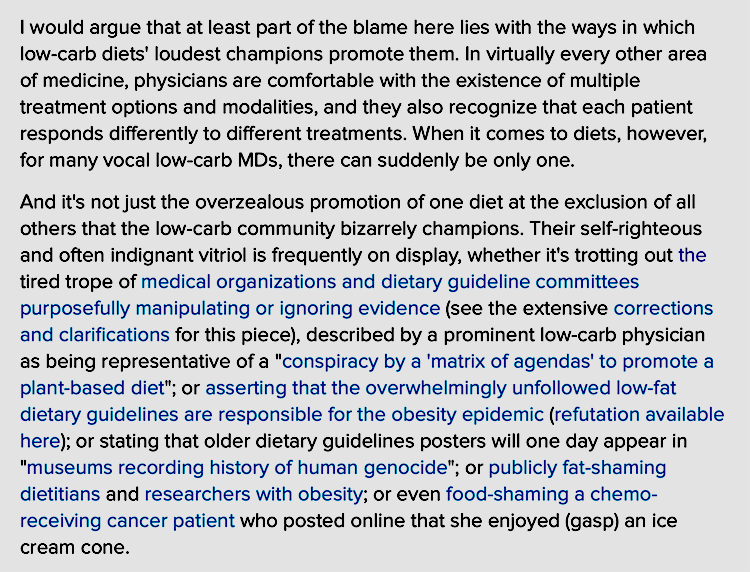
Like many of you, I find it most interesting when critics sling their arrows at the revolution happening in the human nutrition world these days.
I’m specifically referring to the tidal wave of evidence suggesting that consumption of overly processed, carbohydrate-centric, and fat-phobic diets has led to an unparalleled decline in overall health and disease markers over the last 40 years or so, and the rather stunning results that people from all walks of life have had when reverting back to more “ancestral” eating patterns.
And for the sake of discussion, let’s stipulate that these ancestrally-aligned food plans, when compared to the standard American (or Western) diet, are lower carb, feature moderate protein intake, and high amounts of healthy fats. There are a lot of different ways to skin this dietary cat if you will, but for discussion today we’ll focus on a LCMPHF approach.
Like many of you, I read different versions of what are often very repetitive talking points hammering ancestrally-oriented nutrition plans; many of the criticisms are based upon myths, hearsay, and some even overt misrepresentation.
Here are two that particularly caught my eye of late, in part, due to their sources.
An Interesting Perspective From the Foodie World
Late last month, Bon Appetite’s healthyish published this article – Before You Go Paleo, Keto, or Whole30, Think About These Side Effects. The thrust of the piece was that rigid food rules can have unintended consequences, with the author focusing on food obsession and a sense of loss and deprivation, which led to her personal failure when attempting to use Whole 30 to revamp her nutritional paradigm.
The author shared –
…Through my work as an eating psychology coach, I’ve seen that we can’t undo the cycle of dieting and weight gain until we understand what’s underlying our constant desire to drop pounds. At its core, dieting is a coping mechanism, and not a healthy one. We’re not born wanting to change our bodies, but billions of dollars are spent telling us that we should.
I’ve come to believe that, to end the diet-binge cycle, there has to be an inherent acceptance of the bodies we’re in. We don’t have to love it, but we can start with accepting it…
Bottom line – she missed the entire focus, and point, of eating a more ancestrally-aligned food plan. The game is not about deprivation, and it’s not about weight loss. The game is all about optimizing your health and function.
Is weight loss part of that process? It sure as hell can be (or should be) for some of us (obesity rates remain impressively high, just look around at the grocery store today…). But that’s not in any way, shape, or form the primary objective of eating ancestrally. The goal is optimizing health.
An Angry Perspective from Conventional Medicine
Early last month, MedScape, a physician and health provider news aggregator and CME site, published an interesting online piece titled The Low Carb Community is Its Own Worst Enemy.
You’ll need a free account to read the piece in full, and I heartily recommend that you do so when you have 20 minutes to spare. You’ll need that much time to read through the comment section as well; it’s packed with fascinating perspectives and as much vitriol as I’ve seen in some time directed toward the ancestrally-oriented community.
In part, the author’s premise (of note, he’s a family physician working in a bariatric clinic in Canada) is that physicians and leaders of the “low carb community” manifest all sorts of unprofessional and unbecoming behaviors. To wit, from the article –

Of interest – the author calls out what he classifies as vitriol and misrepresentation with, ironically, vitriol and misrepresentation. The comment section is similarly filled with all sorts of fascinating opinions…
I agree wholeheartedly with those who suggest that the increased attacks flowing toward the ancestral or non-standard American / Western diet folks these days are most likely evidence that we’re honing in on significant issues, issues that have been sadly mismanaged by the bulk of conventional medicine and nutrition gurus for several decades now. Why use the term mismanaged? Simply looking at obesity rates and incidence of T2DM is enough to prove the point.
Two quick additional points. The vital key is using the best food and nutrition plan you can find to best suit your personal physiology today – as your system adapts and changes, your nutrition plan very likely will need to as well. Customize, customize, customize.
Second, not all those good folks practicing conventional medicine are out to persecute you as a Paleo guy or keto gal; modern medicine offers so much in terms of potential contribution to your overall health, it’s frankly insane to throw the proverbial baby out with the bathwater here. A thoughtful, skillful, listening primary care doc deserves a seat on your health and wellness team, and they’re out there – you might have to do a bit of prospecting to find one, but they’re out there.



Leave a Reply